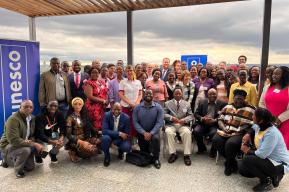News
The impact of ICT on children and teenagers

There is no doubt that information and communication technologies (ICT) play an increasingly important role in the lives of the new generations, however there are still inequalities between genders, which go beyond access.
The effects of these technologies are holistic in the everyday life of the population of children and adolescents: they affect their schooling, physical and mental health, entertainment, socio-cultural development , political life, among other aspects. And while public initiatives are often structured to integrate these effects, the perceptions, assessments and experiences of children and adolescents are not often taken into account.
For this purpose, the UNESCO Regional Office for Sciences for Latin America and the Caribbean, from its Communication & Information programme, has released the publication Children and the use of the Internet in São Paulo and Buenos Aires: research from a gender equality perspective, prepared by an excellent team of researchers from FLACSO-Argentina's Regional Center for Studies on the Development of the Information Society (Cetic.br), the Brazilian Network Information Center (NIC.br) and the UNESCO Regional Chair for Women, Science and Technology in Latin America, where gender differences are related to girls, boys and adolescents' experiences with digital technology
“Information and communication technologies (ICT) represent the fastest and most profound technical change experienced in the region and, indeed, in the world. For example, a robust global pedagogical method has been developed to facilitate the education of large numbers of children; however, it is essential to discuss and offer recommendations for the participation of children and adolescents in ICT laws / policies and strategies”,
said Lidia Brito, director of the UNESCO Regional Office for Sciences for Latin America and the Caribbean.
The findings of the study show how girls and boys' online interactions are marked by gender problems, as well as gaps in the enjoyment of opportunities, the great concern for self-introduction in social networks, the privacy threats and abuse they face in digital environments.
“The study was based on a little-explored premise: the uses of ICT by children and teenagers are more related to their spaces for socialization than to the characteristics of digital environments. The findings demonstrate the importance of analyzing the digital gender gaps and their relationship with different groups and social contexts”,
said Gloria Bonder, coordinator of the UNESCO Regional Chair for Women, Science and Technology in Latin America, FLACSO-Argentina.
The aim of this publication is to raise awareness among various stakeholders of the importance of taking gender into account in the formulation of public policies relating to the use of ICT by girls , boys and teenagers. In order to leverage the positive aspects of the Internet and optimise the opportunities it provides both girls and boys, collaborative efforts to reduce the disparities found in this study are necessary.
“Analyzing the access and use of ICT by girls, boys and teenagers through a qualitative approach, based on a gender perspective, is extremely relevant for the development of inclusive public policies that address the opportunities and consequences, often unequal, of technologies.”
said Tatiana Jereissati, coordinator of Qualitative Methods and Sector Studies at Cetic.br/NIC.br.









